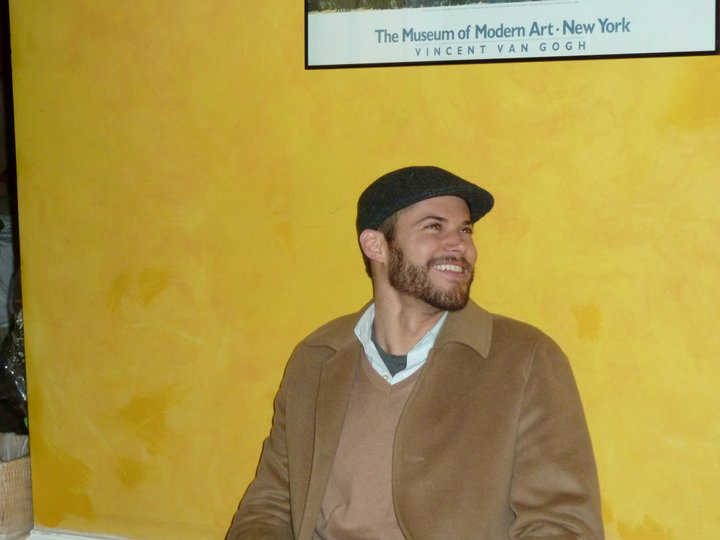Eugene Garcia-Cross was one of us just over a decade ago: holed up in the Cathedral of Learning and studying for exams.
“The Cathedral was the center of my universe,” said the Pitt alum, who graduated in 1999 with a degree in history and English, and completed his MFA in creative writing in 2006. As an undergrad, he would often spend hours on the fifth floor of the educational pantheon, studying with classmates.
Now, Garcia-Cross has traded Oakland’s most iconic study spot for a work space near Hollywood’s Walk of Fame, ditching study sessions for table reads. But he’s still writing about the city.
The 35-year-old became a creative writing professor and then a screenwriter after leaving Pitt. Garcia-Cross, who is half Puerto-Rican, got his start in the television industry through the National Hispanic Media Coalition’s 2015 television writers program.
The fellowship helped him get a job as a writer’s production assistant on ABC’s upcoming “Downward Dog” primetime series. The show, which takes place in Pittsburgh, features a recently single woman, Nan, and her changing relationship with her dog, Martin. As a production assistant, he sat in the writers room, taking notes and preparing scripts for table reads with the actors.
“When the writers would finish a script, [ABC] and network executives would read it and give their notes,” Garcia-Cross said. “I was basically the go-between the writers and the facility.”
Garcia-Cross took a meandering path to Hollywood. As a first-year at Pitt, he wasn’t even interested in writing — like so many other students, Garcia-Cross was pre-med. With no passion for the material, he started skipping classes and struggled to get passing grades. It wasn’t until his sophomore year, when he took a class under the late poet Bill Kushner, that he realized his passion for fiction writing.
“I completely fell in love [with writing],” Garcia-Cross said. “I went from being a C student to one who took every language, literature and writing class I could.”
He joined The Pitt News as a staff writer, where he primarily covered local news, and while working on his master’s, he became an editor for an on-campus magazine called “Nidus,” now known as “Hot Metal Bridge.” On the weekends, he would listen to various authors read Downtown, always looking for ways to improve his own writing.
Even after discovering writing, Garcia-Cross still wasn’t looking to Hollywood. He started writing short stories, which have appeared in publications including Narrative Magazine and American Short Fiction, and he published a book of short stories, “Fires of Our Choosing,” in 2012.

“I thought I would be a short story writer for the rest of my life,” Garcia-Cross said.
Following short stories as a career after his MFA, Garcia-Cross spent years working as an adjunct professor of creative writing at Penn State Behrend College, in his hometown of Erie, Pennsylvania, and writing short stories.
His former colleague, Tom Noyes, a professor of English at Behrend, remembers Garcia-Cross as an open and receptive professor who often met with students to continue discussions brought up in class.
“He was always eager to learn just as much from them as [they] learned from him,” Noyes said.
Cathy Day, currently a creative writing professor at Ball State University in Indiana, has similar memories of Garcia-Cross. Day was on Garcia-Cross’ thesis committee when he completed his MFA at Pitt in 2006, and has continued to be his mentor. She was initially drawn by his “clean, graceful” writing and eagerness to learn outside of the classroom.
“[Garcia-Cross] is always really good about asking for help,” Day said. “I would give him advice and he would come visit me in my office and bring some of his mom’s jelly.”
The two stayed in touch after he finished his MFA, and Garcia-Cross even read drafts of her book, “Comeback Season,” to give her notes.
But the life of a writer in academia isn’t for everyone. According to Day, Garcia-Cross is an extrovert, and would often struggle when he would seclude himself for hours to write on his own.
“It doesn’t surprise me that he’s found new ways to be a storyteller,” Day said.
Garcia-Cross took his first step toward this new path once he underwent open heart surgery in 2010, after doctors discovered he had a congenital heart defect. After the experience, he realized he wanted to see new cities, and relocated to Chicago with his wife in 2011, where he taught as a visiting professor at Northwestern University, the University of Chicago and Columbia College Chicago.

He stayed there until 2014, when he and his wife moved to New York, and he began teaching at Drew University. But he felt the pay didn’t compensate for the effort professors put into their work.
“I saw how tough it is to make a living in academia,” Garcia-Cross said. “There are so few tenure positions, and it’s just very competitive.”
As he considered his other career options, Garcia-Cross thought of a screenwriting course he’d taken in grad school, taught by Carl Kurlander, Pitt film professor and writer of “St. Elmo’s Fire.”
“[Kurlander] would bring people like Louie Anderson to class, and he was always talking to us about Hollywood,” Garcia-Cross said.
Thinking back to those classes again in the Spring 2015, Garcia-Cross locked himself in his apartment, and in two weeks cranked out his first scripts since grad school. The first was a speculative episode of Netflix’s “The Unbreakable Kimmy Schmidt,” used to demonstrate his writing ability and not as a produced script for the show.
The second script was an original pilot called “Rice and Dreams,” about a Puerto Rican chef who starts a food truck with her family after her once-successful restaurant goes bankrupt.
With those scripts, Garcia-Cross placed as a finalist in the highly competitive ABC/Disney TV writer’s fellowship, and ultimately secured a spot in the television writing fellowship by NHMC, a month-long intensive screenwriting workshop geared toward preparing Latinos for writing jobs at major television networks. While visiting his mother in Erie in May 2016, he received a call offering him the job on “Downward Dog.”
“I felt a little validated,” Garcia-Cross said. “I left Erie looking for something different, and I felt like this was that something different.”
Those successes gave him the confidence to pursue screenwriting full time. He’s currently working with Pittsburgh-based director Ryan Postas to turn his short story “The Brother,” from his book “Fires of Our Choosing,” into a short film this summer.
Garcia-Cross has also been working closely with Al Madrigal — best known as the Latino correspondent from “The Daily Show with Jon Stewart” — on a variety of new projects, including a pilot recently sold to CBS studios called “Call Me Al.”
He’s had a considerable amount of success for a burgeoning screenwriter less than one year into his career, but Garcia-Cross said students interested in the entertainment industry can achieve the same.
“Take advantage of the organizations available to you. Go to all the meetings and all the lectures around you, and research, research, research,” Garcia-Cross said. “The more you know, the more prepared you are to do this kind of work.”


